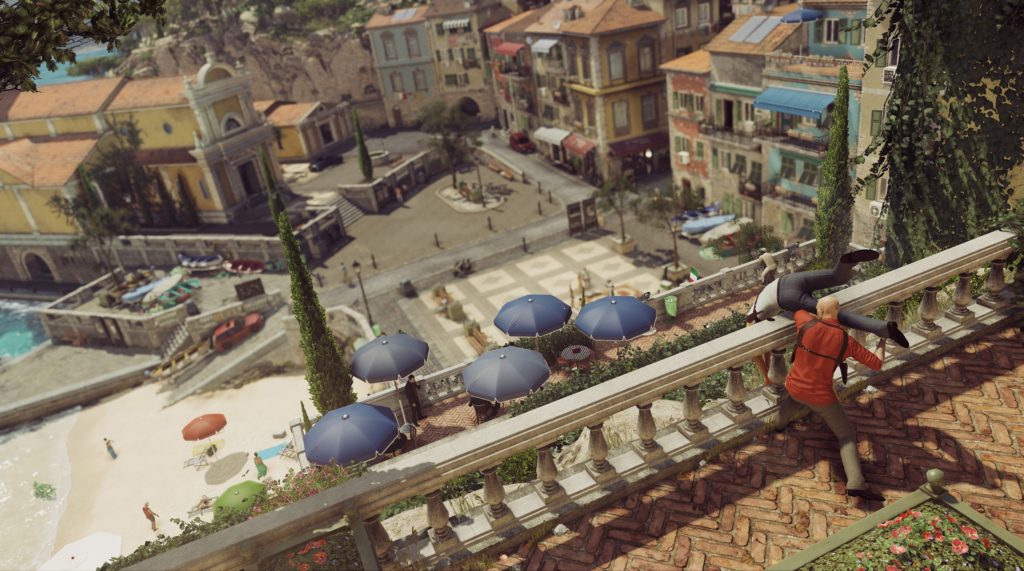
IO Interactive and WB games have officially announced Hitman 2, with a PC, PlayStation 4 and Xbox One release date set for 13th November this year. Directly following the events of the last game, its sequel will send Agent 47 on ‘a global adventure’ as he hunts the Shadow Client and his militia across another 6 expansive sandbox levels. The first mission has already been confirmed, and will have 47 assassinating targets during a motorsport race in Miami.
Standard and Gold Editions of the game can be pre-ordered now for £54.99/$59.99 and £79.99/$99.99 respectively; with the latter granting 4-day early access to the game and a range of extra content, including 2 planned expansions. The US PlayStation Store has also listed a Silver Edition ($79.99) which includes only the launch DLC and access to the first expansion once its available. The Collector’s Edition, detailed on the Hitman website, offers everything contained in the Gold, along with a host of collectible items; such as a gun case replica, a rubber duck and 47’s signature coin (retail information for this edition is not currently listed on the official site but GameStop have reportedly priced it at $149.99).
All editions also provide access to a new ‘Sniper Assassin co-op mode’, which can be played instantly upon pre-ordering any version of the game. The mode can be attempted solo or with a friend, and tasks players with taking out 3 targets during a wedding using only their sniper rifles. The mode has a unique arcade feel to it, with players being confined to a single location and forced to use only their perceptive skills and tactical prowess to spot the cleanest way to assassinate each target using only a few well-placed bullets.
Arguably the most important aspect of the reveal, however, is an official confirmation of the rumour that has been circling for some time: Hitman 2 will not follow an episodic release format. Come 13th November, all 6 levels will be released as one complete title. While many gamers will no doubt rejoice at this knowledge, I for one can’t help but feel a little bit disappointed.
The Essence of ‘Periodic Play’ – problems vs prospects
Now don’t get me wrong, I never used to be a fan of the structure used in the first game. I consider myself to be a fairly patient person, but episodic games always seem to succeed in bringing out a rather undignified sense of impatience in me. As a massive admirer of story-driven titles, being restricted to periodic play-sessions – each generally lasting only a couple of hours – for me effectively stunted the immersive narrative experience contained within each game. With TV its fine, you immerse yourself in one episode and only have to wait a week for the next one. But imagine if HBO decided to combine Game of Thrones’ ninth season into 3 separate 2-hour episodes, with a vision to releasing one every 3 months. There would be rioting in the streets.
Anticipation is a powerful tool when telling a story. Giving viewers time to ponder the events of each episode and speculate on the possible events of the next cultivates a compelling sense of excitement, while also encouraging a sense of community; where fans can share with each other their take on current events, as well as theories on where the season might be headed. But 3 months, put bluntly, is just too long a wait. I am a huge fan of Telltale’s games, for instance, and generally have little trouble immersing myself in each episode as its released. But in between those releases, I find myself simply switching off. Rather than my sense of immersion being kept alive via anticipation, community-sharing and an ever-growing state of excitement, it instead slips into a sort of temporary coma and is left on life-support for 3 months until I actively try and revive it again. Admittedly I am almost always successful, but regardless I can never help but feel its lost its momentum along the way – as if I’m having to build it up from scratch all over again.
With Hitman, however, there was something crucially different. There is no denying that when the game was first announced to be adhering to an episodic release schedule, I instantly rolled my eyes. The notion of having to wait for each individual episode as it was developed was frustrating, to say the least, and I couldn’t help but worry that frustration would cause me to replay each level to death until I eventually grew bored of the game as a whole. Come Episode 2’s release, however, IO already had me eating those words along with a nice slice of humble pie for dessert. Of all the games I have installed on my PS4, Hitman is unquestionably among my favourites and I have no qualms admitting that arguably the most pivotal reason behind this is the fact that it was released episodically.
Where narrative-driven games relied on immersing players in a story, Hitman relied only on immersing players in a sandbox. Each level was a living, breathing environment filled to the brim with intricate aesthetic detail and a range of uniquely gratifying assassination techniques.

Whilst I believed being ‘forced’ to replay missions just because they were all that was currently available would diminish the game’s overarching sense of variety, it instead served to showcase just how much variety each individual level was lovingly infused with. The adventure-seeker in me couldn’t wait to see each of the elaborate, level-specific assassination opportunities whilst my inner inventor had me exploring every location end-to-end, trying to create my own methods for eliminating each target. The perfectionist in me ensured I spent ample time crafting a flawless silent-assassin run for each mission. And finally the completionist in me wouldn’t stop until he’d ticked off every last one of those XP challenges whereupon true ‘mastery’ of each level had been unequivocally achieved. Being ‘forced’ to milk each level dry of content allowed me to transparently see them for what they were: masterpieces of sandbox entertainment.
To be fair this sentiment was closely protected by IO’s generous release schedule, with players only having to wait a month for each mission. But the logic remains: Hitman’s experimental sandbox formula is arguably best experienced via periodic play. Couple that with the valuable time afforded to the developer to tweak and refine every gameplay element, using fan-feedback as a valuable guide to doing so, and I can’t help but lament a little that the episodic structure hasn’t caught on for the franchise.
There certainly are an array of potential benefits of developing and releasing the game as a complete project; such as the incentive to place a more intimate focus on narrative (which the last game was certainly lacking) and perhaps an opportunity to incorporate set-piece events into certain levels to help them remain fresh, even if played consecutively. Perhaps the first game essentially just served as a lesson to educate me on where the true essence of Hitman lies, and approaching the sequel with that sense of understanding will ensure I devote the proper attention to each individual mission regardless of the release structure.
Either way, a new Hitman game is most definitely an exciting prospect. I only seek to humbly advise everyone out there: once it’s released, try not to rush through the campaign just because you can. Savour the experience (if you’ve completed the story by the end of November, you might not be playing it right). Explore, experiment, exhaust. Your next targets aren’t going anywhere, take your time getting to know the ones in front of you.
Hitman 2 is set for release on PC, PS4 and Xbox One on 13 November 2018 for owners of the Standard and Silver Editions, and 9 November for anyone who pre-orders the Gold or Collector’s Edition.




